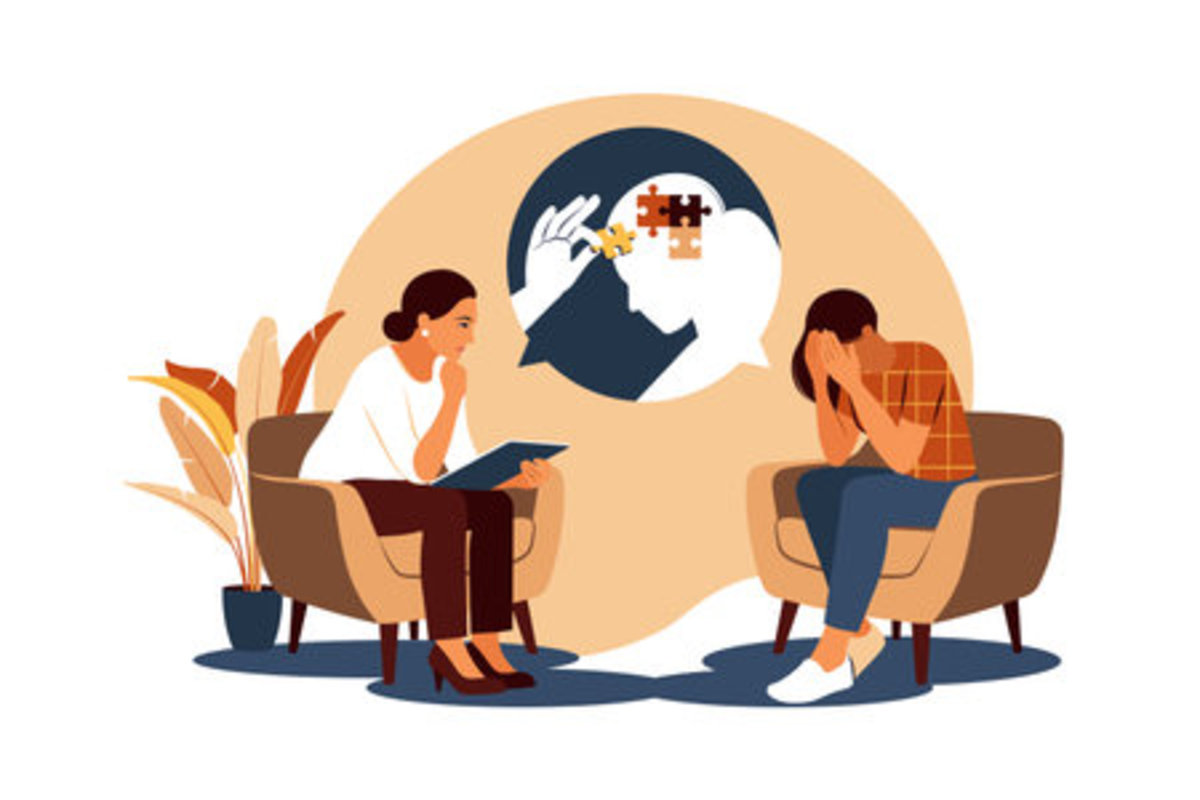Client-Centered Psychology: All About What the Client Needs! (First Hub)
Religious Psychology?
Imagine this:
You walk into your psychologist's office because you have an issue that you want to deal with.
Let's just say you are a woman and you just lost your baby in the seventh month. For you gentleman reading, it is a stretch but bear with the thought. It is going somewhere.
You feel as if a stone crushed your womb and heart at the same time and you seek someone in which to confide and find solace.
Now, comes a little back-story.
In order to get to this point, say you went to church and spoke to your minister, rabbi, imam, or such--let's just say you are Christian. You went to your Church leader in the first place because of your guilty feelings about how the situation began--an act of fornication that led to impregnation. Your church leader compassionately recommends a faithful, Christian psychologist to help you--a member of the pastor's large flock of followers. Imagine the rest, and let's move on.
We have established that you are Christian, a woman, depressed and miserable because you lost your baby--or pretend, remember men?
The man-of-God-recommended psychologist's office that you walk into (and remember, this is on the recommendation of a minister whom you trust and adore) feels warm and inviting. Your attending counselor touts himself as a Christian Psychologist. So, you pour your heart out to him and tell him that losing your baby was the worst thing ever that could have happened to you.
You tell him that you felt the life growing inside of you stop moving and it crushed you. You tell him that you had to deliver the infant cadaver. You tell him you want to know why you should try to live life anymore!
The recommended of God therapist (or at least recommended by one of his servants) examines you coolly, with compassionate eyes, and tells you, amidst your tears and heartache, "Your baby died because it was conceived in sin. It is your fault!"
Do I have to say more about this?
Does anyone else see anything wrong with a psychologist saying something like that to a woman who just lost her baby? Do you think that her depression and hurt went away after dealing with that person? No, it did not. In fact, I bet it became worse.
I came upon this true tale from a classmate during a discussion about religion and therapy. I am of the opinion that religion is an important part of psychological healing and can lead to a permanent solution to psychological problems. Unfortunately, there are some who share horror stories about a religious psychologist who twists the brains of trusting people. I could not let this exception of a twisting pass by without sharing here for others to consider. I pray to God the above story is an exception to the rule.
Religious Therapy

Role of Psychologist
Pertaining to Religions and Lifestyles of their Clients
With a humanistic approach to psychology, I feel that cognitive functions are spiritual in nature, though I understand the incorporation of environment and behavior, Where we mature helps determine many factors in our psychological well-being. People are naturally good, I determine and want to succeed. People have an inherent desire to be "whole" and feel "complete" with all about them.
When the natural cognitive functions stray away from honest and normal desires for wholeness and completeness, and people become ill, seeking to do ill towards others and themselves, healing can occur with therapy. Unless something physically vexes the brain, like a chemical imbalance--calling for the inclusion of artificial supplements, DRUGS, counseling can work.
Carl Rogers

Good Devil
In order for a person to feel comfortable and complete psychologically, he or she must have people in his or her life who provide unconditional positive regard, which is one of the tenets of Carl Rogers.
This means that there has to be someone who, without question or judgment, cares about and supports the client's well-being--offering encouragement and attention always. This does not mean the supporting person agrees with what the client has done or supports negative actions. It DOES mean the supporting person will continuously regard the person without judgment no matter the action the client commits.
This emotional/mental connection allows the client to open up to the therapist in a way that allows her to feel safe. It allows the client to have a sounding boarding for all types of challenges.
The supporting person does not even have to be a therapist for this positive regard to occur though I recommend seeking professional help always for serious psychological challenges.
Extreme Positive Regard!
I relate a tale paraphrastically of a few women who plotted against one collective friend. This friend never said an ill word toward or about another person to the knowledge of this group of friends.
She always had kind things to say and encouraging praise no matter how degenerate the person to whom she referred. These friends of hers were sure that she did not have something positive to say about the common enemy of God, Satan.
What she said made them all laugh.
She said that he, Satan, was a hard worker--trying to win the souls of men!Now that is positive regard! I should say, she is the type of person each one of us on the planet should have to be our support person/therapist!
Judaism


Faith is Important - Client Centered
Religion is a funny thing in that people tend to believe anything that makes them feel good or secure. For example, for Jewish people, it is important for certain sects to marry in the faith and raise children of the Abrahamic lineage. This distinction gives purpose to some. It provides an identity, exclusivity, and goals.
Knowing beforehand that a client's choice of marriage, residence, education, and such are based on religious or spiritual considerations helps to best treat him or her.
If a therapist is working with a client and that client is Muslim and the therapist could not find the way to best connect with the client because of religious and cultural differences, the therapist should recommend another therapist who has similar views as the client to increase empathy and understanding.
If a therapist understands what drives the client, he or she can carefully guide the client to self-actualization. Once the person accepts and realizes more intimately him- or herself, he or she can cope more easily with situations in her life.

Spiritual Beliefs and Religious Mores Are Necessary
Everyone should have a religion or spiritual belief.
Clients do not have to have a set belief system per se, even though that would be better because it would create a system from which to better help clients relate to the world.
Psychologists should work with whatever system of beliefs a client brings. If the client loves his or her job, the therapist should use that as the focus, if necessity dictates. The point is to find out what is important to the client and use it to help that client reach self-discovery, actualization.
Religion is just one key to helping clients along the road to recovery, albeit an important and defining one, not the only one.
Clients gain control as they feel someone supports them and regard them in a positive light. It gives them confidence knowing that someone really cares and wants to encourage them along.
A parent, teacher, neighbor, school bus driver, or any person can do this. However, when others fail, a therapist can succeed because of training and desire to help.
The value of religion is only given by the person who believes it. A therapist can do little to add value to a person's beliefs, so the focus should not be on validating the client's beliefs, but on validating the person's worth and connecting to the client within his or her system of beliefs without judgment.
Take what is of value to the client and then use it to help the person heal. The reality of a person's belief is also individual.
Focus on the One in Need
Work for what is best for the client.
Having many sessions and earning a profit provides physical comfort for counselors, but the health of the client must be paramount. Clients, go to people that make you feel comfortable. If you prefer a White therapist or an Arab therapist, for whatever reason, then you should go to one.
Politically correct issues have a place in therapy, but not unless gender, race, or religious sensitivity work is directly a working issue in question--such as to help a person change ill behavior towards gender, race, or religion.
Alas, I am not a certified psychologist. So what do I know?
(first article on Hubpages)
This content is accurate and true to the best of the author’s knowledge and is not meant to substitute for formal and individualized advice from a qualified professional.
© 2009 Rodric Anthony Johnson








